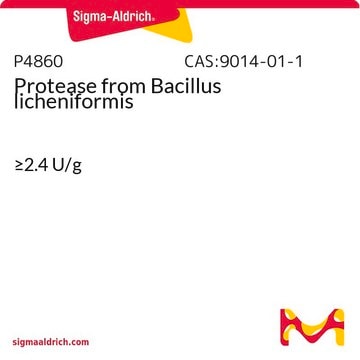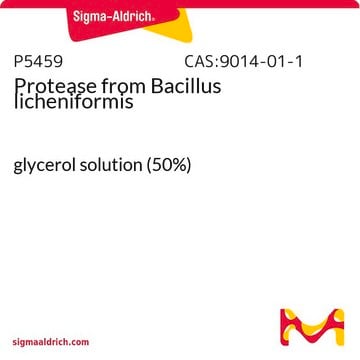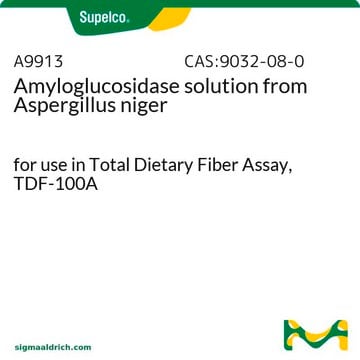P5380
Protease from Bacillus licheniformis
Type VIII, lyophilized powder, 7-15 units/mg solid
Synonym(s):
Proteinase from Bacillus licheniformis, Subtilisin A
About This Item
Recommended Products
biological source
Bacillus licheniformis
Quality Level
type
Type VIII
form
lyophilized powder
specific activity
7-15 units/mg solid
mol wt
27 kDa
purified by
crystallization
solubility
10 mM NaAc (pH 7.5) and 5 mM CaAc: soluble, clear
H2O: soluble, colorless
foreign activity
DNase ≤5.0 Kunitz units/mg solid
RNase ≤0.05 Kunitz units/mg solid
storage temp.
−20°C
Looking for similar products? Visit Product Comparison Guide
Related Categories
General description
Specificity
Application
Biochem/physiol Actions
Physical properties
Unit Definition
Signal Word
Danger
Hazard Statements
Precautionary Statements
Hazard Classifications
Acute Tox. 4 Oral - Aquatic Acute 1 - Aquatic Chronic 2 - Eye Dam. 1 - Resp. Sens. 1 - Skin Irrit. 2 - STOT SE 3
Target Organs
Respiratory system
Storage Class Code
11 - Combustible Solids
WGK
WGK 2
Flash Point(F)
Not applicable
Flash Point(C)
Not applicable
Personal Protective Equipment
Certificates of Analysis (COA)
Search for Certificates of Analysis (COA) by entering the products Lot/Batch Number. Lot and Batch Numbers can be found on a product’s label following the words ‘Lot’ or ‘Batch’.
Already Own This Product?
Find documentation for the products that you have recently purchased in the Document Library.
Protocols
Use this protocol to for the entire immunohistochemistry (IHC) procedure through staining and visualization of specific antigens in paraffin-embedded tissue sections.
Use this protocol to for the entire immunohistochemistry (IHC) procedure through staining and visualization of specific antigens in paraffin-embedded tissue sections.
Use this protocol to for the entire immunohistochemistry (IHC) procedure through staining and visualization of specific antigens in paraffin-embedded tissue sections.
Use this protocol to for the entire immunohistochemistry (IHC) procedure through staining and visualization of specific antigens in paraffin-embedded tissue sections.
Our team of scientists has experience in all areas of research including Life Science, Material Science, Chemical Synthesis, Chromatography, Analytical and many others.
Contact Technical Service











